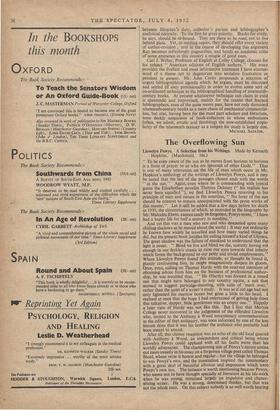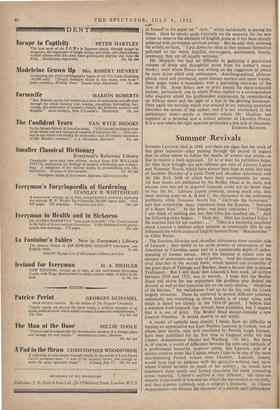The Overflowing Sun
Llewelyn Powys. A Selection from his Writings. Made by Kenneth Hopkins. (Macdonald. 16s.) " To be even aware of the sun as he moves from horizon to horizon is a form of prayer to us who are ignorant of other Gods." That is one of many utterances on the life of man which occur in Mr. Hopkins's anthology of the writings of Llewelyn Powys, and it may be noted that the last of the passages chosen ends with the words " in the sun." Again, even where he is commending with typical gusto the Elizabethan novelist Thomas Deloney (" his realism has never been equalled "), we find Llewelyn Powys reverting to his principle of man and nature in the assertion, " No lover of the sun should be content to remain unacquainted with the prose works of this master." Let it still be added that a few days before his death in 1939, the circumstances of which, as recorded in the biography by Mr. Malcolm Elwin, cannot easily be forgotten, Powys wrote, "1 have had a 'happy life for half a century in sunshine." And yet this was a man who saw and who descanted upon many chilling shadows as he moved about the world ; it may not ordinarily be known how widely he travelled and how many varied things he did, but the present book justifies his calling himself a kind of Ulysses. The great shadow was the failure of mankind to understand that the light is sweet. " Blind we live and blind we die, scarcely having wit enough in our feckleAs crania to raise our eyes towards that infinity which forms the background to our petty and trivial employments." Where Llewelyn Powys found this attitude, or thought he found it, plainly confronting him, he might imaginatively deepen its gloom. Once, even, calling on Thomas Hardy with the reserved intention of obtaining advice from him on the business of professional author- ship, he was troubled thus. " He (Hardy) was dressed in a tweed suit that might have belonged to any country squire, a suit that seemed to suggest partridge-shooting, with calls of 'mark over,' rather than the quiet of a writer's study. It was as if old age had not only lightened his marrow bones but gone a little to his head. I realised at once that the hope I had entertained of getting help from this talkative, dapper, little gentleman was an empty one." Happily a later view of Hardy was not like this. But I fear that Merton College never recovered in the judgement of the offended Llewelyn who, invited to the Anthony a Wood tercentenary commemoration as the editor of that antiquary, was soon informed by one of the less literate dons that it was his brother the architect who probably had been meant to attend.
After all, this clumsy reception was an echo of the old local quarrel with Anthony a Wood, an independent and critical being whom Llewelyn Powys could applaud with all his faults more than his worldly adversaries. The championing side of Powys's nature comes out more sweetly in his essay on a forgotten village poet called Thomas Shoel, whose verse is honest and regular—but the village he belonged to was PowyS's own, and the association inspired the commentary with a great deal of beautiful allusion and impression which were Powys's own too. The instance is worth mentioning because Powys, who seems not to have thought specially of literature as his life-work when he was young, remained largely an impulsive and chance- seizing writer. He was a strong, determined thinker, but that was not the whole man. On this subject nobody is so well worth hearing as himself in the paper on " style," which incidentally is among his finest. Here he speaks quite tutorially on the necessity for the new writer to observe the elements of English prose as it has been already achieved with permanent spiritual power. But he adds that, allowing for artistic revision, " I put down my ideas as they present themselves pell-mell to my mind, fanciful, extravagant, sentimental, bawdy, irrelevant, they are all equally welcome."
Mr. Hopkins has had no difficulty in gathering a good-sized volume of lively and thoughtful prose from his author's many books ; even where Powys was writing on the suggestion of others he soon drove afield with enthusiasm. Autobiographical, philoso- phical, rural and provincial, upon literary matters and upon travels, these pages make a miscellany with a prevailing character of the love of life. Some letters new to print extend the many-coloured picture, particularly one in which Powys replied to a correspondent who enquired about his profoundest experience& by remembering an African dawn and the sight of a lion in the glowing landscape. Once again the worship which was noticed in my opening quotation identifies the nature of this author, and it is not overlooked in the preliminary essay—partly a memoir—which Mr. Hopkins has supplied as a personal and a critical admirer of Llewelyn Powys. It is a case where the right man has performed a due task in literature.
EDMUND BLUNDEN.



























































 Previous page
Previous page